News
FAO meets with the Minister of Agriculture of Bangladesh during PARTNER project scoping mission
The Honorable Minister, H.E. Dr.

The Honorable Minister, H.E. Dr.

The Director-General of the Food and Agriculture Organization of the United Nations (FAO), QU Don

The "Making Every Voice Count for Adaptive Management" (MEV-CAM) Initiative was created in 2020 a
There has been rapid economic transformation across the developing world over the past three decades, with notable increases in economic output, improvement in human development, and expansion of trade, investment and finance. Some of these developing countries have become major players in global development and economic governance owing to their economic progress, technological advances and contribution to a global pool of tested solutions to pressing development challenges.
The 2030 Agenda places increasing emphasis on South-South and Triangular Cooperation (SSTC) as both means to support effective capacity-building and the objective of enhancing cooperation. It underscores the need to mobilize resources through SSTC and strengthen SSTC partnerships on capacity-building, science, technology and innovation.
The Food and Agriculture Organization of the United Nations (FAO) has embraced South–South and triangular cooperation (SSTC) as a key delivery modality to catalyse agricultural development, food security, rural development. FAO has over 40 years of experience as a leading promotor and facilitator of SSTC in agriculture, food security and nutrition. Today, SSTC is fully integrated within FAO's Strategic Framework and is a key delivery modality in the implementation of FAO's projects and programmes.

FAO is calling for submissions of good practices and success stories from the agrifood sector.

Express your interest to join as a Knowledge Provider and showcase your organization's expertise and experience.

Share your knowledge and insights and create or contribute to the discussions. For more information click the link below.

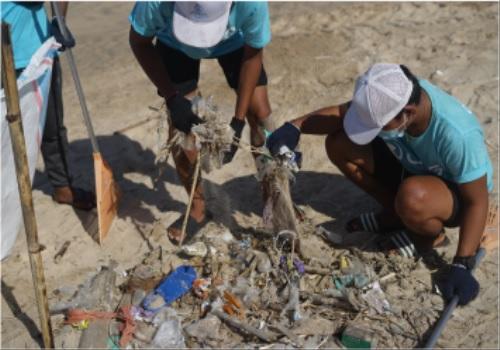
Explore information on FAO's South-South and Triangular Cooperation projects and
FAO has embraced South-South and triangular cooperation (SSTC) as a key delivery modality to catalyze agricultural development, food security, rural development, poverty reduction and nutrition ove
Read more
The Food and Agriculture Organization of the United Nations (FAO) has embraced South-South and triangular cooperation (SSTC) as a key delivery modality to catalyse agricultural development, food security, rural development, poverty reduction and nutrition over the past two decades. FAO has strengthened its support for SSTC since 2012, and the SSTC portfolio has been expanding in line with the progressive institutionalization of SSTC in FAO.
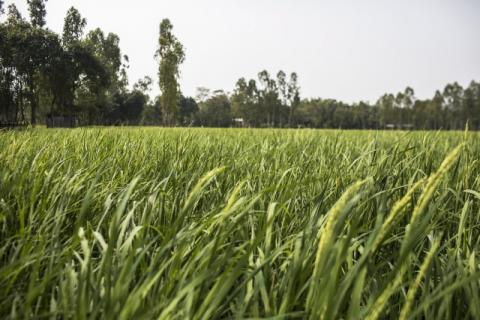
The Honorable Minister, H.E. Dr. Muhammad Abdur Razzaque, Minister of Agriculture of the People's Republic of Bangladesh, had a fruitful meeting on 11 December 2023 with the scoping mission of the Food and Agriculture Organization of the United Nations (FAO) headed by Mr. Nafis Khan, Senior Programme Officer, South-South and Triangular Cooperation Division (PST), FAO.
The primary objective of the scoping mission was to identify areas for the potential provision of technical assistance and implementation support to the Program on Agricultural and Rural Transformation for Nutrition, Entrepreneurship, and Resilience (PARTNER), in Bangladesh. PARTNER is a joint loan project with a financial envelop of USD 543 million, funded by the World Bank and the International Fund for Agricultural Development (IFAD).
Through rigorous multi-stakeholders’ consultations with the 22 implementing agencies, contributing agencies, strategic partners and other stakeholders, such as the Consultative Group for International Agricultural Research (CGIAR), the mission analyzed the different deliverables assigned to each of the agencies, in order to spot potential areas for technical assistance and implementation support provisions for PARTNER.
The weeklong consultations provided a platform to reassess existing capacities, potential for FAO’s support, as well as joint opportunities for key players of PARTNER to synchronize their activities, to achieve overall targets of the program, labeled as ten Disbursement Linked Indicators.
A wide range of national experts and officials participated, such as institutes, entities of the Ministry of Agricultural and the CGIAR member institutes.
During the meeting, the Minister provided a comprehensive overview of the country’s agricultural sector. He highlighted several areas where Bangladesh has achieved remarkable results in ensuring food sufficiency, despite a prevalence of financial and other challenges.
The efficient usage of water remains an issue, but the country has continued to improve the performance of its agricultural sector, for example, by increasing vegetable production, harvesting and processing, and by enhancing the rice value chain. The country does, however, still need to focus on the improvement of storage and market access. In addition, improving rice productivity and main crops for sparing arable lands for marginal crops, such as oilseed crops, was also highlighted.
The Minister showed keen interest in stepping up collaboration with FAO, by requesting immediate support from FAO to implement the PARTNER.
The Minister was briefed by Mr. Nafis Khan on the overall deliverables of this ambitious Program and the probable areas of collaboration. The Honorable Minister conveyed his appreciation of FAO’s support and acknowledged the long withstanding partnership between Bangladesh and FAO in dealing with the agricultural development of the country. The mission reiterated FAO’s continued support to Bangladesh, one of its esteemed member states.
It was agreed that the FAO mission will submit a detailed gap analysis, including a concept note, with a clear set of recommendations on the way forward to engage with the government, focusing on leveraging South-South and Triangular Cooperation in support of the implementation of PARTNER.
Earlier that week, the Honorable Secretary, Ms. Wahida Aktar of the Ministry of Agriculture was given an appraisal of interim progress by Mr. Nafis Khan, based on the findings from the different sessions of the consultations between the scoping mission and the team from the Ministry of Agriculture.
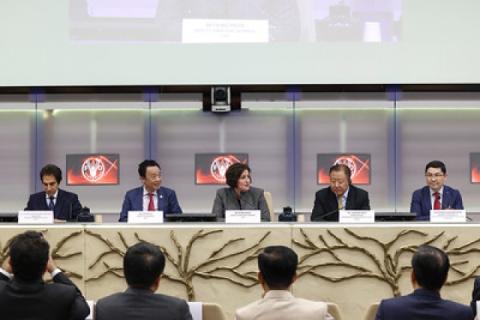
The Director-General of the Food and Agriculture Organization of the United Nations (FAO), QU Dongyu, on Wednesday called on Members and all other stakeholders to provide financial, technical and human resources to support the implementation of FAO’s One Country One Priority Product (OCOP) Initiative, which can make a real impact to transform agrifood systems.
Qu addressed an event on the OCOP Initiative, under the Framework of the FAO China South-South Cooperation Programme. The event took place in hybrid form on the sidelines of the 174th Session of the FAO Council. Speakers included Malawi’s Minister for Agriculture, Sam Kawale, as well as government officials and Permanent Representatives from Bangladesh, China, Egypt, Trinidad and Tobago and Uzbekistan.
The OCOP was launched in September 2021. It is designed to support more sustainable agrifood value chains of Special Agricultural Products (SAPs), increase access to healthy diets, improve farmers’ livelihoods and economic growth, while minimizing the use of chemical inputs and of natural resources, reducing food loss and waste, as well as minimizing negative impacts on the environment.
SAPs have unique unique economic value, geographical advantages, specific farming practices and cultural heritages. Examples of SAPs already supported by the initiative include jackfruit in Bangladesh, date palm in Egypt, banana in Malawi, cocoa in Trinidad and Tobago, and sweet cherry in Uzbekistan.
As of November, 83 countries across all five FAO regions had expressed interest in promoting the sustainable development of over 50 SAPs, and all of which are potential OCOP project countries.
During Wednesday's event, the global South-South Cooperation project was formally announced to support the implementation of the OCOP initiative. Selected countries shared their experiences in implementing the initiative, while FAO Members were briefed on the initiative’s progress and the way forward. Members and relevant stakeholders were called to actively support, participate and promote its implementation.
To date, more than $14 million from various sources have been mobilized to support the implementation of the OCOP initiative in 53 countries.
As the largest single contribution to the OCOP initiative, China has provided $5 million to support this new global OCOP project under the FAO-China South-South Cooperation Programme supporting capacity-development and demonstration activities in 15 countries. These are Congo, Ghana, Lesotho, Malawi and Tanzania in Africa; Bangladesh, Cambodia and Samoa in Asia and the Pacific; Georgia and Uzbekistan in Europe and Central Asia; Chile, Mexico and Trinidad and Tobago in Latin America and the Caribbean; and Egypt and Iraq in the Near East and North Africa.
Innovative solutions in the global South are key for tackling food insecurity, poverty and other development challenges. South-South and Triangular Cooperation has become an integral part of FAO's support to country-level action to achieve food security and nutrition, and rural development, by creating synergies with related initiatives.
The OCOP initiative is a powerful catalyst for transformation and for accelerating progress in the implementation of the FAO Strategic Framework 2022-31, in support of the 2030 Agenda for Sustainable Development and achieving the Sustainable Development Goals.
More on this topic
One Country One Priority Product (OCOP) Initiative
FAO China South-South Cooperation Programme
Contact
FAO News and Media
(+39) 06 570 53625
FAO-Newsroom@fao.org
Nicholas Rigillo
FAO News and Media (Rome)
Nicholas.Rigillo@fao.org
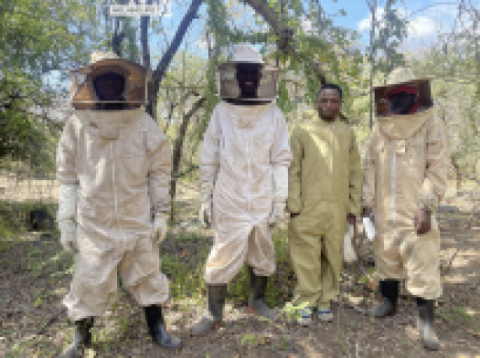
The "Making Every Voice Count for Adaptive Management" (MEV-CAM) Initiative was created in 2020 and alters the way South-South knowledge management is approached by using local and indigenous knowledge to restore degraded drylands with more sustainable practices. By empowering communities and stakeholders to demonstrate their skills, express their challenges, and share successes, the most significant impacts of development projects can be visualized from the process of change itself.
One Country One Priority Product (OCOP) is a FAO's flagship initiative designed to transform agrifood systems by supporting countries in promoting their special agricultural products which are uniq
Read moreThe FAO MEV-CAM Initiative has worked with local communities to produce a series of participatory videos, empowering them to capture and document best practices and Most Significant Changes brought
Read moreRecent global challenges caused by disruptions in the food supply chain have exposed the fragility of global food security and agrifood systems.
Read more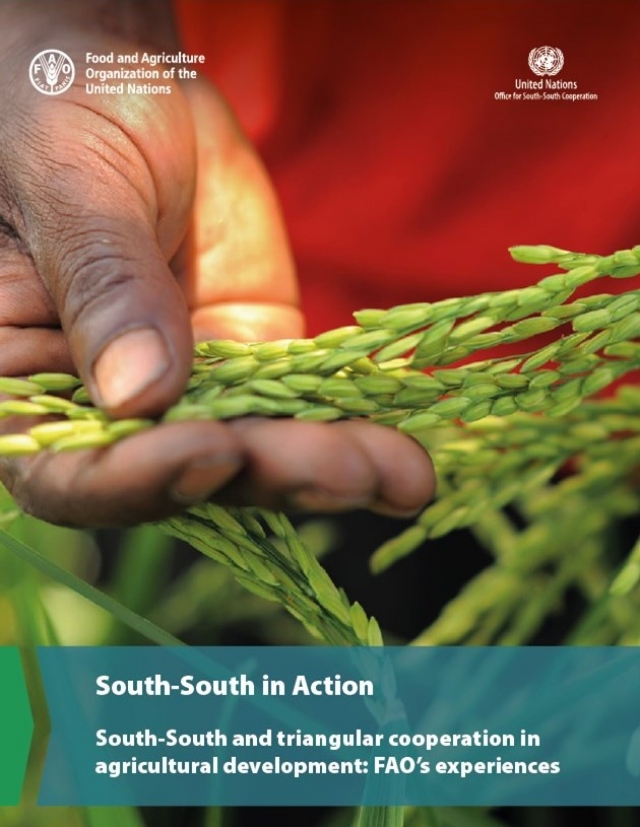
This publication outlines key features of South-South and Triangular Cooperation (SSTC) and how FAO has applied SSTC to the delivery of its mission. The case studies presented provide a window on how SSTC has contributed to alleviating hunger and malnutrition in countries across the global South and has helped build resilience in the face of climate change and other development challenges. The lessons learned from these experiences are feeding into the new FAO SSTC Guidelines for Action (2022–2025) and will guide FAO's future results-based SSTC programmes.
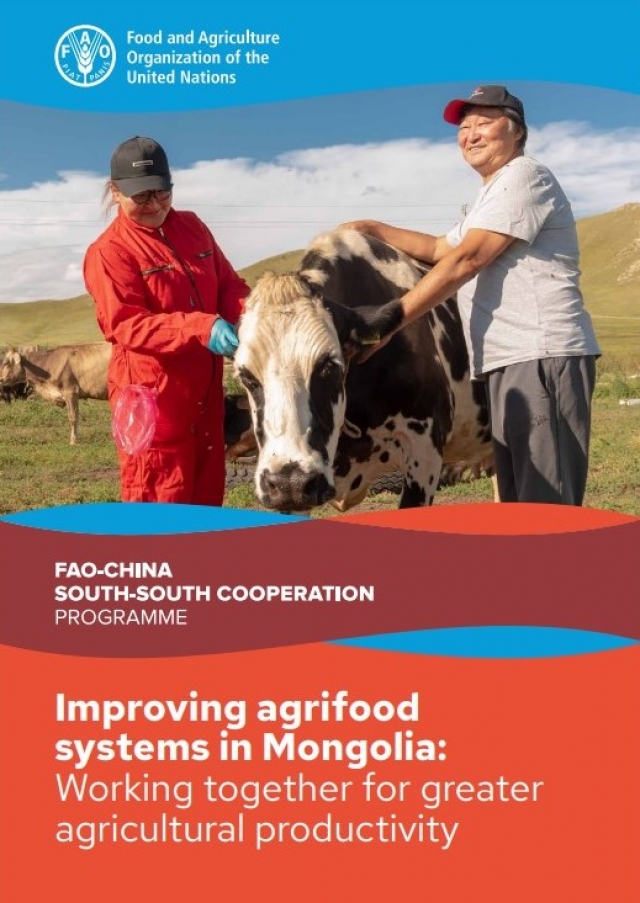
Sustainable agricultural development lies at the very heart of FAO’s mission to achieve food security and ensure that people everywhere have regular access to enough high-quality food to lead active and healthy lives.
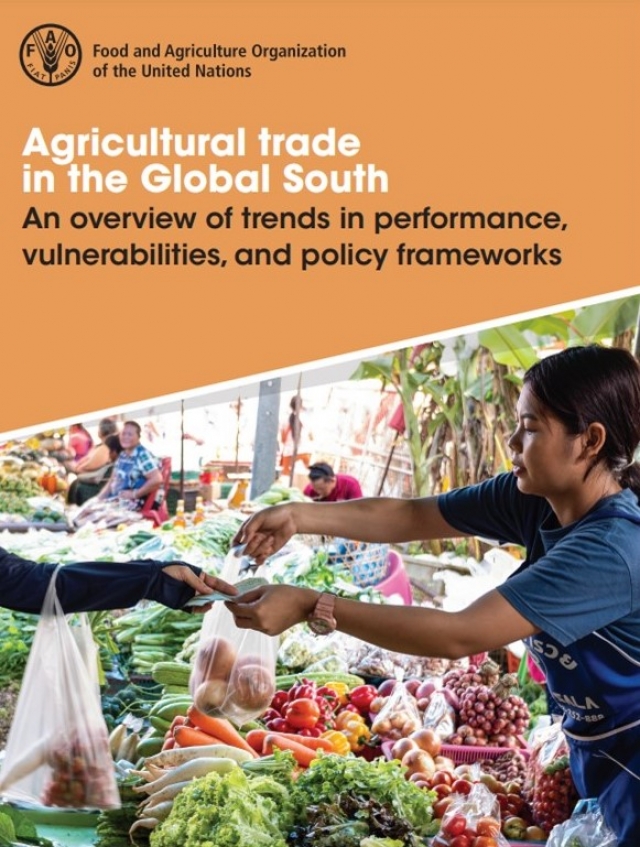
The importance of South countries in global agrifood markets and trade has been increasing over the last two decades, with growth in their participation, as both exporters and importers, having outpaced that of North countries. South countries, as a group, are net exporters of fruits, vegetables, fats and oils, and tropical products such as coffee, tea, cocoa and sugar, and net importers of key food commodities such as cereals, meat and dairy products. These patterns reflect structural changes along the development path.
20/04
2023
21/04
2023
Training programme organized for FAO Staff from the Asia-Pacific Region
04/04
2023
05/04
2024
Training programme organized for FAO Staff from the Near-East Region
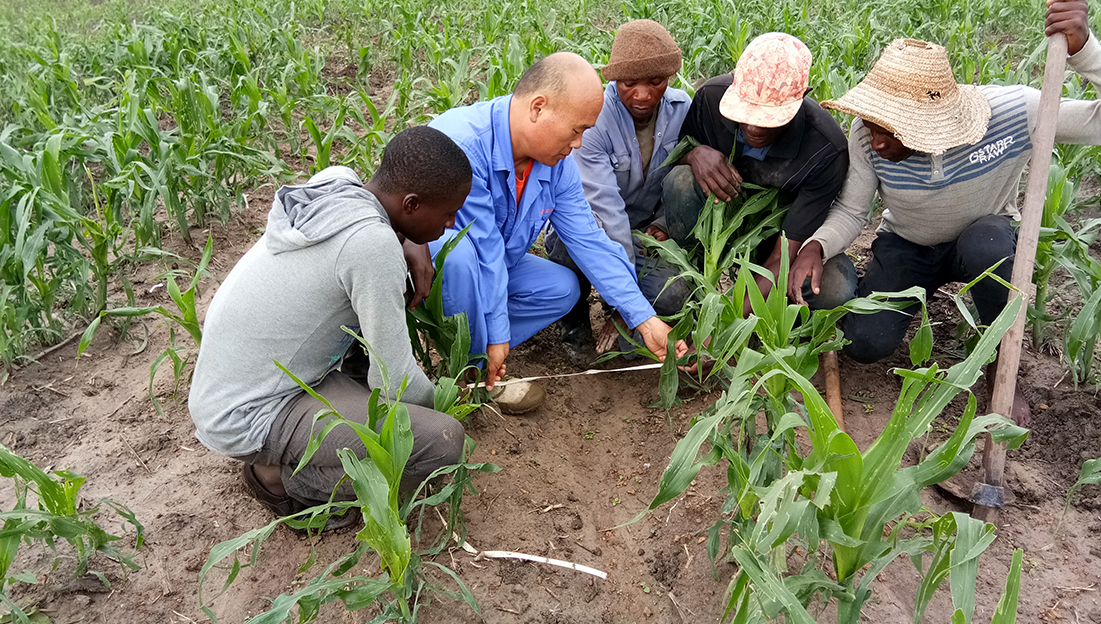
South-South Cooperation (SSC) is defined as a mutual sharing and exchange of knowledge, experience, technical and financial resources related to agriculture and food systems between two or more developing countries, as well as collective actions in pursuit of their individual and/or shared development objectives.
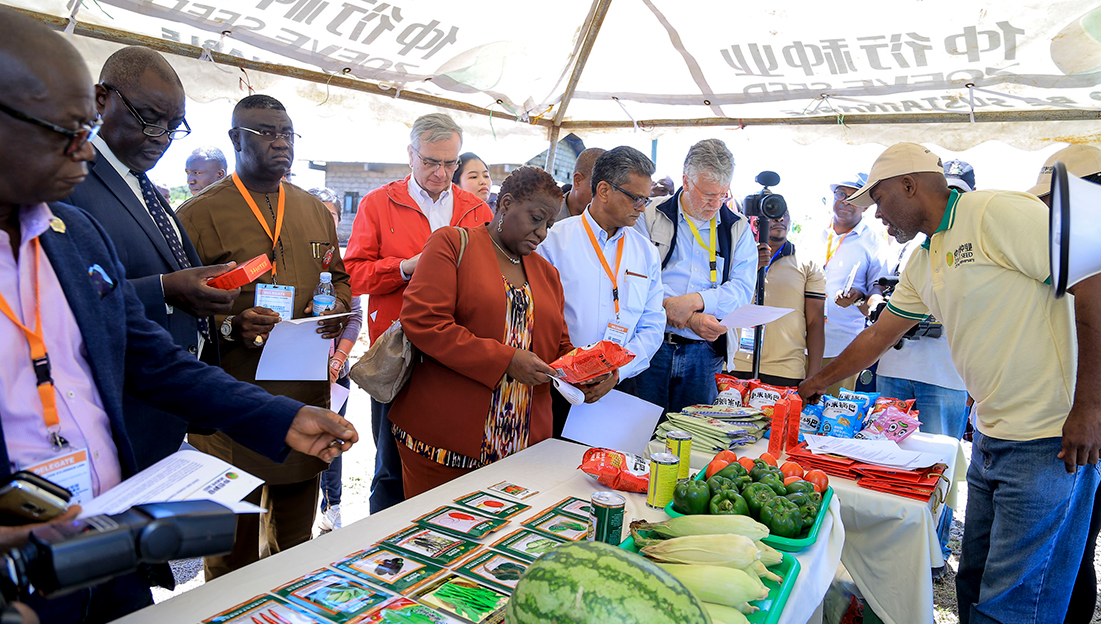
Triangular Cooperation (TrC) is defined as a development cooperation framework whereby two or more developing countries, alongside other development stakeholders, engage in mutually beneficial collaboration and exchanges with the support of a developed country(ies) and/or multilateral organization(s).
Join the conversation
@FAO4Members
#SSTC
#TriangularCooperation
#SouthSouthCooperation
South-South and Triangular Cooperation Division (PST)
FAO Headquarters
Viale delle Terme di Caracalla
00153 Rome, Italy